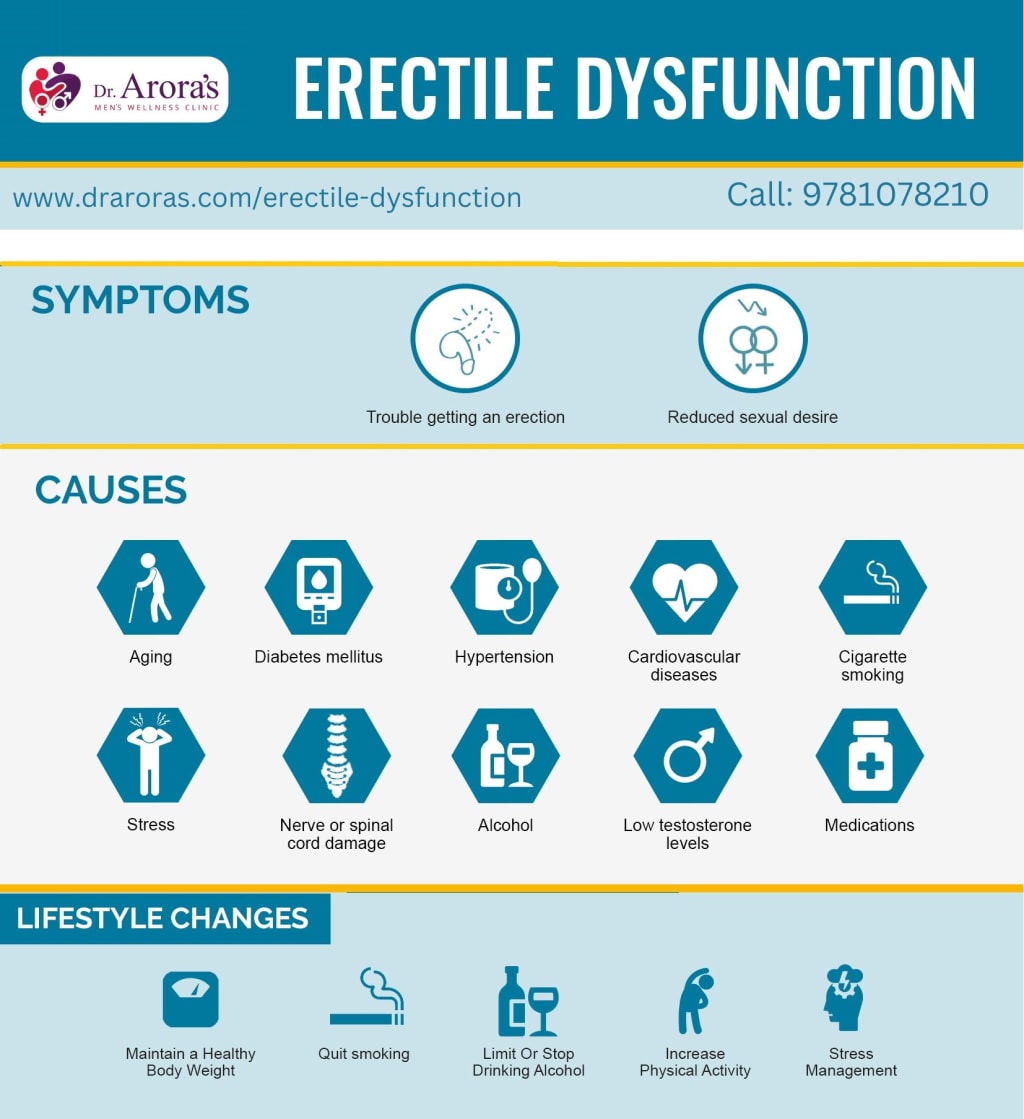What is Erectile Dysfunction?
Erectile Dysfunction

Introduction:
It is often a sensitive topic to discuss, leading to embarrassment and frustration. However, understanding the causes, symptoms, and available treatments for erectile dysfunction is crucial for seeking appropriate medical help. In this blog post, we will delve into the definition of erectile dysfunction, explore how erections work, discuss the different types of ED, and shed light on its causes, symptoms, diagnosis, and treatment options.
Definition of Erectile Dysfunction:
Erectile dysfunction is a persistent condition that affects a man's self-confidence, sexual relationships, and overall quality of life. Occasional difficulties in achieving or sustaining an erection are common and not necessarily a cause for concern. However, when it becomes a recurring problem, it may be indicative of underlying health issues that require attention.
How Erections Work:
To understand erectile dysfunction, it is important to grasp the mechanics of an erection. Erections involve a complex interplay of the nervous system, blood vessels, hormones, and psychological factors. When a man is sexually aroused, the brain sends signals to the nerves in the penis, triggering the release of chemicals that relax the muscles and allow blood to flow into the erectile tissues. This increased blood flow results in the engorgement and expansion of the penis, leading to an erection. Any disruption in this process can contribute to erectile dysfunction.
What Are The Different Types of ED?
Erectile dysfunction can manifest in various ways, and it is essential to recognize the different types to determine the appropriate course of treatment. Here are some common types of ED:
Organic ED: This type is caused by physical factors such as vascular diseases, diabetes, hormonal imbalances, or neurological disorders that interfere with the normal functioning of the penis.
Psychogenic ED: Psychological factors, such as stress, anxiety, depression, or relationship problems, contribute to psychogenic erectile dysfunction. It may occur in men who have no physical issues but experience difficulties due to mental health-related factors.
Mixed ED: As the name suggests, mixed ED involves a combination of both physical and psychological causes.
Erectile Dysfunction (ED): Causes, Symptoms, Treatment & Diagnosis:
Causes of Erectile Dysfunction:
Erectile dysfunction can stem from various factors, both physical and psychological. Some common causes include:
Chronic diseases: Conditions like diabetes, heart disease, high blood pressure, and obesity can contribute to ED by affecting blood flow and damaging nerves.
Hormonal imbalances: Low testosterone levels or abnormal thyroid function can impact sexual function.
Medications and substance abuse: Certain medications, including antidepressants and blood pressure drugs, can cause ED. Excessive alcohol consumption, smoking, and illicit drug use can also contribute to the problem.
Psychological factors: Stress, anxiety, depression, relationship conflicts, and performance anxiety can all contribute to erectile dysfunction.
Injury or surgery: Trauma to the pelvic area or surgery in the prostate, bladder, or rectal region can affect erectile function.
Symptoms of Erectile Dysfunction:
The primary symptom of erectile dysfunction is the inability to achieve or maintain an erection sufficient for sexual intercourse. Other symptoms may include reduced sexual desire, difficulty initiating or sustaining erections, and decreased sexual satisfaction.
Treatment and Diagnosis:
The treatment for erectile dysfunction depends on the underlying cause and severity of the condition. It is important to consult a healthcare professional for a proper diagnosis and personalized treatment plan. Some common treatments for ED include:
Testosterone Therapy: If low testosterone levels are contributing to erectile dysfunction, testosterone replacement therapy may be prescribed.
Talk Therapy: Psychological counseling, such as cognitive behavioral therapy (CBT) or psychosexual counseling, can help address underlying emotional factors that contribute to ED.
Hormone Replacement Therapy: In cases where hormonal imbalances are the cause, hormone replacement therapy may be recommended.
Vacuum Erection Device: This non-invasive device creates a vacuum around the penis, drawing blood into the area and facilitating an erection.
Penile Implants: Surgical insertion of penile implants can provide a more long-term solution for men with severe ED.
Intracavernosal (ICI) and Urethra (IU) Therapies: Medications injected directly into the penis (ICI) or inserted into the urethra (IU) can help improve blood flow and induce an erection.
Self-Injection Therapy: Self-injection therapy involves injecting a medication into the base of the penis, which promotes blood flow and helps achieve an erection.
Intraurethral (IU) Therapy: A medicated pellet is inserted into the urethra using an applicator to improve blood flow and facilitate erections.
Cognitive Behavioral Therapy (CBT): CBT techniques can help address negative thoughts and anxiety related to sexual performance, thus improving erectile function.
Psychosexual Counselling: Counseling sessions with a trained therapist can help resolve relationship issues, improve communication, and enhance sexual function.
Surgical Treatment: In some cases, surgical interventions may be necessary to address underlying anatomical issues that contribute to ED.
Sensate Focus: This therapy technique involves gradually reintroducing sexual touch and intimacy, focusing on pleasure and relaxation rather than performance.
Pelvic Floor Muscle Exercises: Also known as Kegel exercises, strengthening the pelvic floor muscles can help improve erectile function.
Erectile Dysfunction Diagnosis: When to See a Doctor?
A doctor specializing in sexual health can provide a comprehensive evaluation and recommend suitable treatment options. It is particularly important to consult a healthcare professional if erectile dysfunction is accompanied by other concerning symptoms or if it significantly affects your overall well-being.
Key Takeaways:
Erectile dysfunction is a common condition that affects men worldwide. It can be caused by a range of physical and psychological factors, and it is essential to seek medical attention for a proper diagnosis and personalized treatment plan. Various treatment options, including medications, therapy, and surgical interventions, are available to address erectile dysfunction and improve sexual function. Remember, seeking help is a positive step towards regaining your sexual health and overall well-being.
What is erectile dysfunction?
Erectile dysfunction (ED) is the inability to achieve or maintain an erection sufficient for sexual intercourse. It is a common condition that can have physical or psychological causes.
What causes erectile dysfunction?
Erectile dysfunction can be caused by various factors. Physical causes include chronic diseases (such as diabetes and heart disease), hormonal imbalances, medication side effects, and injury or surgery. Psychological factors, such as stress, anxiety, depression, and relationship problems, can also contribute to ED.
Can psychological factors contribute to ED?
Yes, psychological factors can contribute to erectile dysfunction. Stress, anxiety, depression, performance anxiety, and relationship conflicts are some examples of psychological factors that can affect sexual function.
How is erectile dysfunction diagnosed?
To diagnose erectile dysfunction, a healthcare professional will typically ask about your medical history, conduct a physical examination, and may order additional tests to determine the underlying cause. These tests may include blood tests to check hormone levels, a psychological evaluation, and imaging tests to assess blood flow.
What are the treatment options for erectile dysfunction?
Treatment options for erectile dysfunction vary depending on the underlying cause. They may include lifestyle changes (such as exercise and a healthy diet), medications (such as oral PDE5 inhibitors like Viagra), testosterone therapy, counseling or therapy, vacuum erection devices, penile implants, and surgical interventions.
Is erectile dysfunction a natural part of aging?
While it is more common in older men, erectile dysfunction is not considered a natural part of aging. It is often caused by underlying health conditions or other factors that can affect blood flow, nerve function, or psychological well-being.
Can medications cause erectile dysfunction?
Yes, certain medications can contribute to erectile dysfunction as a side effect. Examples include some antidepressants, blood pressure medications, antihistamines, and certain prostate cancer treatments. If you suspect that your medication is causing ED, consult your doctor for potential alternatives.
Can lifestyle changes help improve erectile function?
Yes, adopting a healthy lifestyle can positively impact erectile function. Regular exercise, maintaining a healthy weight, eating a nutritious diet, reducing alcohol consumption, quitting smoking, managing stress, and improving sleep habits can all contribute to better sexual health.
What is the role of testosterone in erectile dysfunction?
Testosterone is a hormone that plays a role in sexual function. Low testosterone levels can contribute to erectile dysfunction. In such cases, testosterone replacement therapy may be prescribed to improve erectile function.
Are there any natural remedies for ED?
Some natural remedies may help improve erectile function, but their effectiveness varies. Examples include certain herbs (such as ginseng and horny goat weed), L-arginine supplements, and acupuncture. It is important to discuss these options with a healthcare professional before trying them.
Can erectile dysfunction be a sign of an underlying health condition?
Yes, erectile dysfunction can sometimes be a symptom of an underlying health condition. It may indicate cardiovascular problems, diabetes, hormonal imbalances, or neurological disorders. Consulting a doctor can help identify and address any potential underlying health issues.
What is the success rate of ED treatments?
The success rate of ED treatments varies depending on the individual and the chosen treatment option. Oral medications like PDE5 inhibitors have shown a high success rate, with approximately 70-80% of men experiencing improved erectile function. Other treatments, such as penile implants or surgical interventions, also have high success rates, but the specific success rate will depend on individual factors and the expertise of the healthcare provider.
Can erectile dysfunction be cured?
In many cases, erectile dysfunction can be effectively treated and managed. The success of treatment depends on identifying and addressing the underlying cause. While some causes may be reversible, others may require ongoing treatment or management. It is important to consult with a healthcare professional to develop an appropriate treatment plan.
How does stress affect erectile function?
Stress can have a significant impact on erectile function. It can disrupt the normal physiological processes involved in achieving and maintaining an erection. Stress triggers the release of hormones like cortisol, which can constrict blood vessels and reduce blood flow to the penis, making it difficult to achieve an erection. Additionally, stress can contribute to psychological factors such as anxiety and performance anxiety, further exacerbating erectile dysfunction.
Is it normal to feel embarrassed about discussing ED with a doctor?
It is common for men to feel embarrassed or hesitant to discuss erectile dysfunction with a doctor. However, it is important to remember that healthcare professionals are trained to handle such concerns with sensitivity and confidentiality. They are experienced in diagnosing and treating erectile dysfunction and have likely encountered similar cases before. Seeking medical help is essential for proper diagnosis and effective treatment, so it is encouraged to overcome any discomfort and have an open conversation with a healthcare provider. They are there to help you regain your sexual health and overall well-being.
Still, have concerns? Book an Appointment at Dr. Arora Clinic:
If you have any concerns or questions regarding erectile dysfunction, it is highly recommended to consult a qualified healthcare professional. Dr. Arora Clinic specializes in sexual health and offers personalized treatment options tailored to your specific needs. Take the first step towards regaining your sexual confidence and book an appointment with Dr. Arora Clinic today. To take treatment Visit: https://www.draroras.com/erectile-dysfunction-treatment
About the Creator
Pawan Kumar
Pawan help peoples suffering from erectile dysfunction and provide information about permanent treatment for erectile dysfunction from expert sexology doctors. For Information Visit: https://www.draroras.com/erectile-dysfunction-treatment
Reader insights
Nice work
Very well written. Keep up the good work!
Top insight
Heartfelt and relatable
The story invoked strong personal emotions






Comments
There are no comments for this story
Be the first to respond and start the conversation.